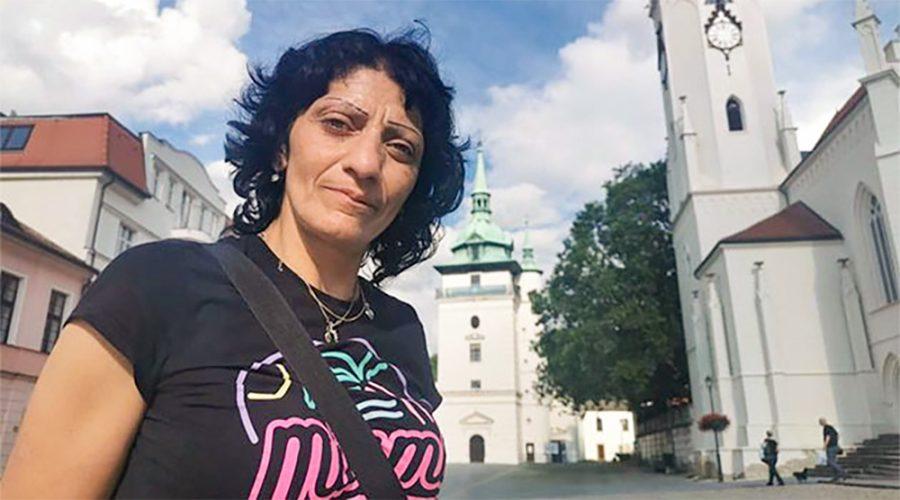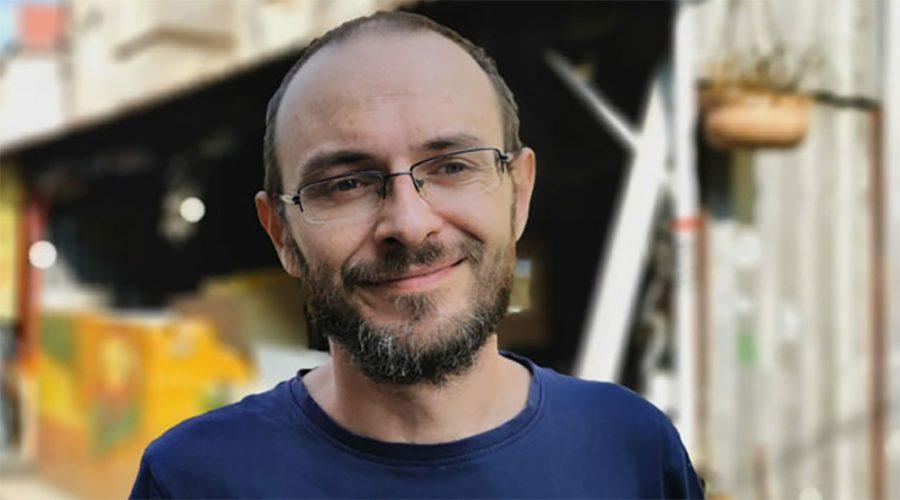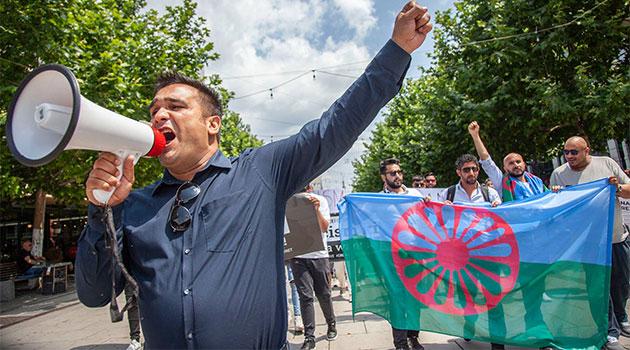The legal battle in the Stanislav Tomáš case continues. While nothing can bring him back to life, his sister Simona says the family will never give up on justice

In June 2021, a Romani man named Stanislav Tomáš died either during or immediately after police officers intervened against him in the North Bohemian town of Teplice, Czech Republic. A bystander happened to film the police officers kneeling on him as he was handcuffed, resulting in a video that is very reminiscent of the fatal intervention by officers against George Floyd, an African-American, in the USA.
An investigation by the Czech General Inspectorate of the Security Forces concluded that the intervention by the police was not connected to the death of Mr. Tomáš; according to an expert assessment, the cause of death was heart failure and Mr. Tomáš had been intoxicated with methamphetamine. The intervention itself, however, sparked a wave of criticism by both Czech and international organizations, and in a report on the investigation of that intervention, then-Deputy Public Defender of Rights Monika Šimůnková said the officers committed errors by not monitoring Mr. Tomáš’s state of health and not calling an ambulance in time. His death raised many questions and sparked Europe-wide protests of solidarity by Romani people and their allies demanding the thorough investigation of his death.
The bereaved family members decide to seek protection through the courts with the aid of their legal representative. They have not been successful so far in the Czech courts which, at different levels, have rejected their lawsuit, and currently the case is before the justices of the Czech Constitutional Court. If the bereaved will not find protection there, then the case will head to the European Court of Human Rights in Strasbourg. The interview below was conducted with the sister of Stanislav Tomáš, Ms. Simona Tomášová, and with Miroslav Brož of the Konexe organization, which has long been aiding the bereaved after the tragedy. The interview took place in the apartment where Simona lives with her ailing mother and is her sole caretaker.
Q: Ms. Simona, your brother died a year and a half ago. How are you doing?
Simona: Right now, when everything is getting more expensive, including food and medicines, it’s difficult to get by on a low income. Fortunately, my mother and I are both healthy, overall – she has her illness, but it’s not getting any worse. We’re happy that we have a decent place to live, many Romani people do not have such luck. We are grateful to Mr. Brož and Konexe for that.

Miroslav: The credit for that doesn’t belong to us, but to the kind donors who made it possible for us to finance and organize moving Ms. Simona and her mother out of the horrible, overpriced apartment in a dangerous building in the ghetto where they were living at the time of Stanislav’s death. I’m glad we are doing this interview, including for readers in the German-speaking world, because most of our donors were from Germany and this is an opportunity to thank them again.
Simona: We thank you all very much.
Q: You don’t strike me as a “client” and a “social worker”, but as good friends.
Simona: I don’t see Miroslav as a social worker, it’s more like he aids me in communicating with the social workers when we have problems with them. All that we’ve been through has brought us together, some really ugly experiences and some really nice ones, when things turned out well. We managed to organize a dignified funeral for my brother, to arrange new housing and other things. When my brother died, Míra was the first to turn up. He said we were going to need a good lawyer, he offered us one right away, free of charge, and he began to assist us with other things. Soon after that, various other people started turning up and promising us different things, advising us on what to do. I was brokenhearted by my brother’s death and confused by the enormous attention we were getting from all sides, I didn’t know who to believe. When the media attention died down, everybody else disappeared, but Míra and Konexe remained with us.
Miroslav: After Stanislav’s death we began looking for his bereaved relatives and we quickly found them. I contacted Maroš Matyáško, an attorney with the Forum for Human Rights, a legal organization that has long aided impoverished Romani people pro bono and with whom we have been working for a long time. Mr. Matyáško immediately agreed to represent the bereaved family. After that, the European Roma Rights Centre (ERRC) generously offered to pay his services. Without the Forum for Human Rights and the ERRC, in my opinion, the case of Stanislav Tomáš would never have even begun. The handling of the case is a consequence of a collaboration among different individuals and organizations who have joined forces. As for the relationship Simona and I have, while I am a social worker by training, our association, Konexe, does not work using the methods that are customarily used by social workers in the Czech Republic, rather, we use the methods of community social work and critical social work. The people whom we help are not “clients” to us, but neighbors in need. I consider Ms. Simona to be a friend of mine who is dealing with serious problems and needs aid.

Q: What was your cooperation like after you found legal representation?
Simona: It was necessary to arrange and pay for a decent funeral for my brother and to deal with a lot of paperwork around his death. We had to decide if we wanted to let the issue alone so we could have some peace, or whether we would fight in the courts for justice and speak about my brother’s death publicly. Míra explained to us that it wouldn’t be easy and that it would take several years. Stanislav deserves justice, so we decided to fight.
Miroslav: It was difficult to organize the funeral for Stanislav Tomáš. On the one hand, it was actually quite expensive because we had to wait a long time for a second autopsy and it was necessary to lease a refrigeration box for many days. The extended family and members of the Romani community wanted to see him one last time, so we organized a traditional Romani funeral with an open casket, and for that to be possible, we had to pay for the body to be embalmed and prepared. We were aided with covering all of these costs by donors from the Czech Republic, from Scotland, and mainly from Germany.
Simona: Then my mother and I moved out of that wreck in the ghetto.
Miroslav: After we paid for the funeral, we discovered that some money was left over, and most of the donors agreed we could use it to address the housing situation of Ms. Simona and her mother. They needed a good place from which to fight the legal battle that awaited them. We are also aiding Simona and her mother with other problems they face.
Q: What kinds of problems?
Miroslav: Simona is caring for her chronically ill, elderly mother 365 days a year, 24 hours a day. Last summer she had to be away for a couple of weeks. We looked for options for her mother’s care to be provided during that time. Given her diagnosis, that was possible only in a specialized clinic. However, the waiting time to access such clinics is about two years, and naturally it’s all much more complicated when the patient is an impoverished Romani woman. It was quite difficult to find an appropriate facility for short-term hospitalization at the last minute. Ultimately, after a lot of effort, we found a place in a clinic, but then it turned out her mother’s health insurance would not cover the stay and it was necessary to pay EUR 2,000 for it. Fortunately, we again found nice donors who raised that amount among themselves.

(PHOTO: OPRE ROMA in Kosovo, Majlinda Hoxha)
Q: Do you believe justice will be done in the case of Stanislav Tomáš?
Simona: I really hope it will. I think that if he hadn’t been a poor Romani man, everything would have happened differently, from the police intervention to the investigation. We won’t give up, though. The most important thing is that my mother and I are no longer alone, there are people who take an interest in my brother’s death and are aiding us. I can’t even imagine what would have happened if I’d been alone, if I hadn’t gotten a lawyer free of charge, because I could never afford a lawyer otherwise.
Miroslav: I think it’s exactly as Simona says. For us to see this case through to the end, for the family to get protection from the courts, support for the bereaved is crucial. Konexe does its best to do everything we can, but without the support we receive from abroad, it wouldn’t work.
Q: How do you imagine the case continuing?
Simona: We know from our attorney that the case will probably end up at the international court in Strasbourg and we believe the judgment there will finally favor us. I can’t wait for that day to come. A famous sculptor has offered to produce a beautiful tombstone for my brother, and I am looking forward to that. I know nothing can bring my brother back to life. I do hope, though, that once the truth comes to light, the police will be more cautious in the future, behave differently, maybe that will spare somebody else’s life.
Miroslav: I don’t want to predict the future, but I have great faith in the family’s legal representative. Simona and her mother can rely on our continued support as well. We’ve come a long way already and I hope the worst is behind us, that we’ve reached the top of the hill that it was so exhausting to climb, and now we can walk down into the valley.